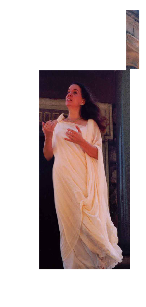
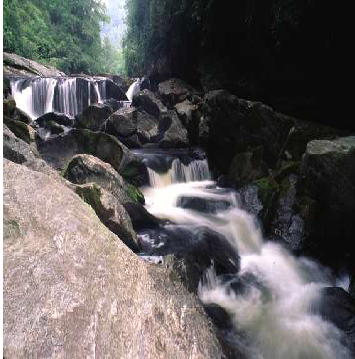
KATHLEEN GEGAN’S MUSIC AND ART:
GIFTS TO BE CHERISHED

Neal Starkey is revered throughout
the southeast U. S. as one of the finest bass players
in jazz and classical music.
He is known as “Awesome Neal,” and brings genius
to his recording of his “first take” of Kathleen’s music.
His performances include W. C. Handy Music Festival,
The Atlanta Ballet, and symphonies.
He is in constant demand with local jazz clubs & private venues.
Life is full of mystery, and its greatest mystery is love.
Kathleen Gegan’s music radiates love, and as such is
suffused with mystery. Her music is chant-
not chant. It breathes the aura of ages past, yet is very
much of the present. There is timelessness to her art:
it sounds as if it was written today, yet always existed,
tapping into a reservoir of Cosmic Consciousness.
Just as a lover bares body, mind and soul before the
beloved, so Kathleen bares the innermost recesses of her
heart in her songs. She suffers, rejoices, …exults.
She expresses fears, and doubts, strengths & convictions.
She shares failures and triumphs, sorrows and joys.
Kathleen is unafraid to weep in anguish or explode in …
beatific ecstasy. She takes us to the stars and beyond.
She takes us deep inside to the spirit within.
Her music probes the cosmic questions –Where did we
come from? Why are we here? Where do we go when
we leave this sphere of existence? Kathleen doesn’t
pretend to have all the answers, but she taps
a wellspring of wisdom that brings us closer to the truth. Kathleen and her art are gifts to be cherished
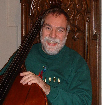
You are listening me sing the acapella version of my music to Cousin Sidney’s poem.



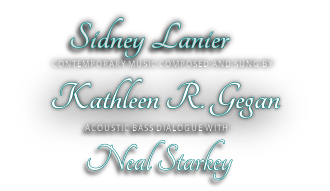
Sidney Lanier, (1842-
The Song of The Chattahoochee in 1877.
He was Poet Laureate of Georgia, Confederate
soldier, child prodigy of violin, flute, organ,
piano, guitar, & banjo. His literary works
survive due to the love and dedication
of his wife, Mary Day Lanier.
Kathleen R. H. Gegan,
a descendant of Sidney Lanier,
composed the music for his poem,
The Song of The Chattahoochee,
when she was in grammar school.
Her solo performances include:
Woodruff Memorial Arts Center:
The HIGH Museum, Wieland Pavilion,
& Walter Hill Auditorium;
Concerts On Peachtree,
in conjunction with ‘96 Olympics;
Hamilton City Hall Rotunda, Bermuda;
Atlanta Audio Society;
The Cathedral of St. Philip, Atlanta;
Global Health & Humanitarian Summit,
Emory University;
The Dome, Grande Anse, Grenada, West Indies;
& Trykimuuseum, Tartu, Estonia..


3.) High o’er the hills of Habersham,
Veiling the valleys of Hall,
The hickory told me manifold
Fair tales of shade, the poplar tall
Wrought me her shadowy self to hold,
The chestnut, the oak, the walnut, the pine,
Overleaning with flickering meaning and sign,
Said, Pass not, so cold, these manifold
Deep shades of the hills of Habersham,
These glades in the valleys of Hall.
2.) All down the hills of Habersham,
All through the valleys of Hall,
The rushes cried Abide, abide,
The willful waterweeds held me thrall,
The laving laurel turned my tide,
The ferns and the fondling grass said Stay,
The dewberry dipped for to work delay,
And the little reeds sighed Abide, abide,
Here in the hills of Habersham,
Here in the valleys of Hall.
1.) Out of the hills of Habersham,
Down the valleys of Hall,
I hurry amain to reach the plain,
Run the rapid and leap the fall,
Split at the rock and together again,
Accept my bed, or narrow or wide,
And flee from folly on every side
With a lover’s pain to attain the plain,
Far from the hills of Habersham,
Far from the valleys of Hall.
4.) And oft in the hills of Habersham,
And oft in the valleys of Hall,
The white quartz shone,
and the smooth brook-
Did bar me of passage with friendly brawl,
And many a luminous jewel lone-
Crystals clear or a-
Ruby, garnet and amethyst—
Made lures with the lights of streaming stone
In the clefts of the hills of Habersham,
In the beds of the valleys of Hall.
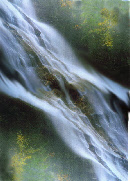
all content © 1945 The Estate of Kathleen R. H. Gegan all rights reserved
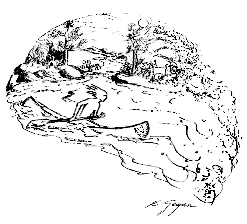
5.) But oh, not the hills of Habersham,
And oh, not the valleys of Hall
Avail: I am fain for to water the plain.
Downward the voices of Duty call—
Downward to toil and be mixed with the main,
The dry fields burn, and the mills are to turn,
And a myriad flowers mortally yearn,
And the lordly main from beyond the plain
Calls o’er the hills of Habersham,
Calls through the valleys of Hall.
Poem: 1877 by Sidney Lanier, Poet Laureate of Georgia
Music: 1957 Kathleen R. Gegan
Derrick Henry
former Classical Music reviewer
The Atlanta Journal-
